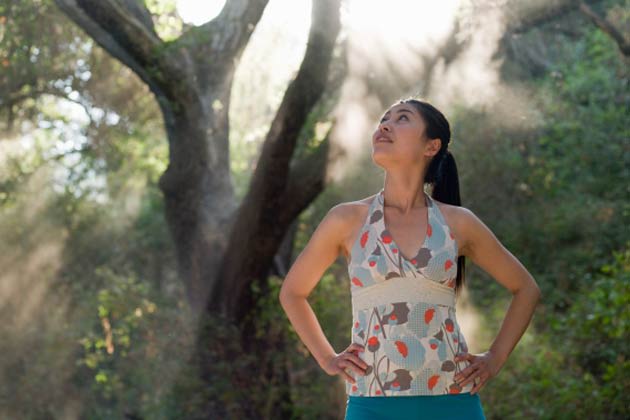 Top 6 wise moves to fight the aging process
Top 6 wise moves to fight the aging processMany of us are looking for ways to stay young and although you can't stop the clock, you can fight the signs of aging and the aging process with a few wise moves. Aside from good skincare habits, maintaining an active lifestyle, and reducing calorie intake, the following tips will help you to look and feel younger for longer.
1. Use your brain
Although the brain isn't a muscle, the old 'use it or lose it' adage still applies. Brain scans show that when people use their brains in unaccustomed ways, more blood flows into different areas of the brain, and new neural pathways form.
In a study in the journal Nature in 2004, young people were taught how to juggle. After three months, MRI scans showed enlargement of the grey matter in their brains—the part responsible for higher mental functions. When the participants in the study stopped juggling, their brains shrank again, suggesting that we need to keep our brains engaged to maintain mental agility and function. So, whether it's a crossword puzzle, Sudoku, or a university degree, trying giving your brain a challenge every day and you'll be more likely to keep your marbles!
Also, another study published in the Journal of the American Medical Association showed that more frequent participation in mentally stimulating activities can lead to a reduced risk of Alzheimer's disease.
2. Be sociable
According to US government research, social isolation is a predictor of declining mental function in older age. Experts believe this may be down to not using a wide variety of communication skills.
Research shows that people who are part of a group—whether it's a church or a book club—are healthier than solitary people when they are older, and that the wider the range of relationships (family, friends, work and so on) a person has, the less cognitive decline they will experience with aging. So, as well as tackling the crossword puzzle on your lonesome, make time in your life for shared activities—and ensure you spend time with as wide a range of people as possible.
3. Increase your intake of antioxidants
As we age, levels of harmful free radical levels rise, while the body's production of antioxidants —the compounds which can 'mop up' free radicals—declines.
According to studies at the Human Nutrition Research Centre on Aging at Tufts University in Boston, antioxidant-rich foods may slow aging processes in the body and brain. Researchers found that foods such as blueberries and spinach could increase the antioxidant power of human blood by 10 to 25 per cent—so try eating more of these.
The antioxidant vitamins A, C and E play a major role in protecting the body against free radicals, so aim not only to get your five-a-day, but also ensure that you take in a wide variety of fruit and veggies, especially those of strong color. Vitamin A in particular helps to keep the skin strong and healthy, which we get in our diet from foods rich in beta-carotene. Carrots are the obvious choice—but sweet potato, pumpkin and melon are also good sources.
4. Have more sex
It's official: getting active between the sheets can help keep you youthful. Sex enhances emotional intimacy, relaxes us, decreases stress, and makes us feel great.
A study conducted by Psychology Today magazine found that the more active and satisfying a person's sex life is, the fitter and healthier they tend to be. For example, athletes who were still competing in sport in their sixties had sex lives comparable to those 20 years younger. And it wasn't just big talk—the researchers interviewed their spouses for verification!
Also, in his book Real Age, Michael Roizen reported that women who are unsatisfied with the quality or quantity of their sexual relationships have a life expectancy half a year less than is average for their age, while women who are satisfied with both the quality and quantity have a life expectancy one and a half years longer than average. For men, having fewer than five orgasms a year shortens life expectancy by two and a half years, while a man having more than 300 orgasms a year will add three years to his life expectancy.
5. Believe in yourself
As well as being physically, mentally and socially active, people who reach old age have a high level of what's called 'self efficacy'. Self efficacy is a blend of self belief and confidence, and studies show that it is a major distinguishing trait in centenarians.
Researchers reported that the older centenarians become, the more they make decisions on the basis of what they believe as opposed to what others expect. They place responsibility for their health with themselves and not their doctors. People with high self efficacy tend to see problems as challenges to be met, setbacks as a reason to double their efforts, and failure as a learning experience for next time.
6. Protect your skin
There are two factors affecting the way we age: intrinsic factors—caused by the genes we inherit—and extrinsic (external or environmental) factors, such as exposure to the sun's rays and cigarette smoking. This is the area that you can take action in.
If you smoke, stop—and if you don't wear a sun protection factor on your skin, start! Without protection from the sun's rays, just a few minutes of exposure each day over the years can add up to cause noticeable changes and damage to the skin, such as freckles, age spots, spider veins and fine wrinkles. Cigarette smoking causes biochemical changes in our bodies that accelerate aging. A person who smokes 10 or more cigarettes a day for a minimum of 10 years is statistically more likely to develop deeply wrinkled, leathery skin than a non-smoker.
Ref: http://sg.news.yahoo.com/blogs/fabulous-mom/look-feel-younger-064542801.html

No comments:
Post a Comment